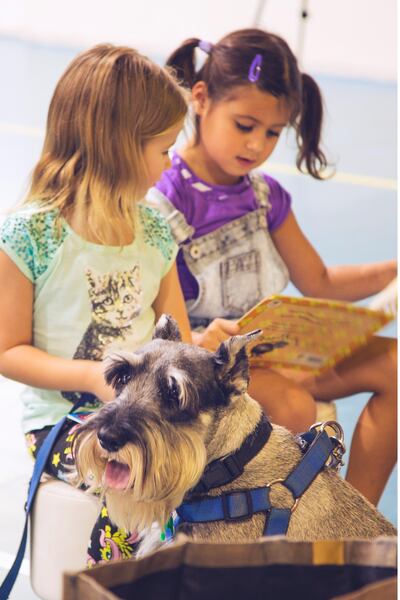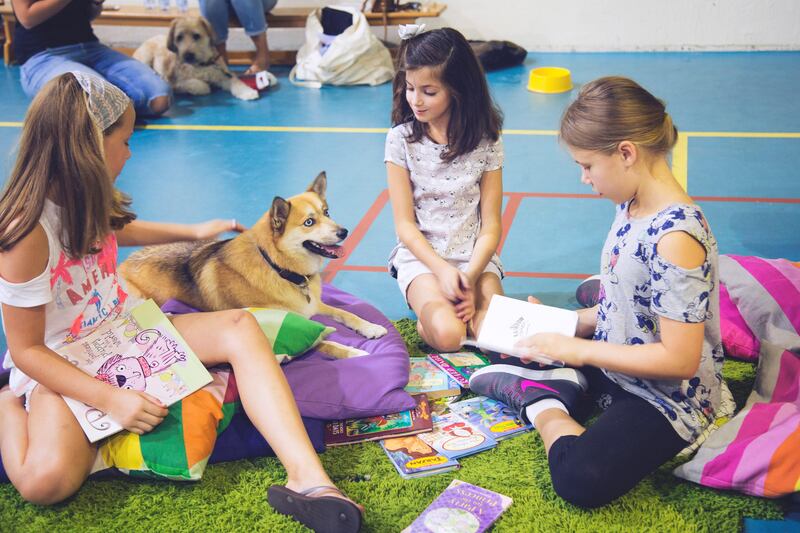Nine-year-old Beth was an avid reader until she and her parents relocated to Dubai. The move brought an onslaught of changes to her life and she lost touch with her love of books.
Beth moved to Dubai five-and-a-half years ago and initially missed her friends and relatives. With her mother suffering from a chronic spinal disease, and her father travelling for work and absent for days at a time, she became anxious and her confidence quickly dropped. She stopped reading for pleasure and would panic when reading aloud, scared others would mock her.
An initiative in Dubai hopes to help children overcome such fears. It will enable children like Beth, who may be shy about reading in front of a group, to read to dogs in the classroom instead. The Reading Dogs UAE scheme will be launched by the Animal Agency at the start of October.
Thor the schnauzer, Lost the German shepherd, Xena the pomeranian, Remy the wheaten terrier, Luna the pomsky, Chip the French bulldog, Wasabi the Maltese, and Milo, Willow and Bertie the golden retrievers will all make an appearance in classrooms.

Reading to dogs is already a common practice in classrooms in the UK, United States and Australia. Beth's mother, Katy, a British expatriate and photographer based in Dubai (who wishes to remain anonymous), says: "Beth's reading was always at an above-average level until she reached Year Three and then, for whatever reason, she regressed very quickly across her subjects, in particular her reading. She was sounding out letters and reluctant to read alone, let alone out loud, which was so sad given her previous love for reading.
"Fortunately, we managed to resolve these issues with the help of a fantastic teacher and some cognitive behavioural therapy. However, I think if the reading to dogs scheme had been available at the same time, her confidence in reading could have been regained quicker."
Katy believes that her daughter's love for dogs and trust in her own dog, which now lives with her grandparents, made her feel safe and gave her someone to talk to when she felt sad or lonely.
"Reading out loud to a dog and receiving the love back would have encouraged her to keep on going, and I believe would have got her reading more frequently again, and she would have regained her love of reading quicker."
Karalynn Thomson, managing director of the Animal Agency, is hoping the Reading Dogs UAE project will help children in mainstream schools, as well as students with special needs and those who are learning English as a second language.
Groups of between four and 10 children will work together in reading sessions of up to 20 minutes, during which they can play with the dog for a few minutes. Thomson says: "There are studies showing that reading to dogs helps children's reading ability, and there are a host of social and emotional benefits. One of the main issues children find with reading aloud is a fear of failure. When they read to the dog, the dog doesn't correct them or stop them or hurry them, and this gives them confidence," she says.
"The effort will be to ensure the same dog goes to the school so children can connect and bond with the dog every week."
Families in the UAE have volunteered their pet dogs, who have been assessed and trained and put through dummy reading sessions. A good reading dog is calm, can sit in one place, and is happy to be touched and stroked.
Back home in Leeds in the UK, Thomson and her business partner used their dogs in nursing homes to help the elderly. And although the reading concept is new to the UAE, there have been nine months of preparations.
With support from Taaleem, the education provider, the Reading Dogs UAE scheme will start at Safa British School in Dubai. Reading Dogs UAE is also working with several other schools in Dubai, as well as the Emirates Literature Festival and Al Serkal Avenue, to organise more reading sessions.
Paula Ryan, head of the foundation stage at Safa British School, is hoping the initiative will improve students' reading and communication skills. "Sometimes children can feel self-conscious when reading aloud in front of classmates, but this has the potential to change that.
"Children will feel at ease and reassured, as the dog cannot answer back, will not judge and will enable them to practise reading aloud. We have many children who struggle with confidence," says Ryan.
Hayley Pearson, learning support leader at Safa British School, says: “The presence of dogs for reading can have a calming effect on children. Reading to dogs can be of benefit to many children, regardless of age or needs. As with any approach or intervention, it is not a one-stop solution, but partnered with a language-rich learning environment, can increase a child’s joy and love of reading.”
_______________
Read more:
[ How an evening spent with a cat whisperer did more than just heal my cat ]
[ Pets in the UAE: How a shifting attitude is seeing more places become animal-friendly ]
[ Money & Me: 'My most cherished purchase was my dogs' adoption fee' ]
_______________
Dr David Lee, lead consultant clinical psychologist at Camali Clinic in Dubai, explains that for some people, communicating with animals is therapeutic. However, he also points out there isn't conclusive research as yet that proves that spending time with animals can be conducive to our well-being.
"Some children may develop anxiety problems or depression because they move around a lot within the UAE, or they move here from their countries as expatriates. It can be a transient place for that population. Children's attachment to others can be disrupted. In some cases, forming a bond with animals can be helpful as part of the process, though this isn't an intervention in itself. Cognitive behavioural therapy can be helpful," he adds.
It is worth noting that some children may struggle to read aloud because they have social anxiety and are shy. This is different from a child who has difficulties reading because of a cognitive issue. But certainly, for a socially anxious child, forming a special bond with a dog can be a coping strategy.
The Sit Stay Read programme in Chicago in 2008 and 2009 used dogs in the classroom to improve student reading and writing outcomes, and was effective in improving second grade students' oral reading fluency scores by 20 per cent, as compared to a comparison group. Meanwhile, in 2010, the University of California conducted a study to find out if reading to dogs could improve reading skills in children. They found that the young readers improved their fluency, felt more confident about their reading abilities and felt safe when reading to a dog.
Beth is certainly convinced. She was part of the Reading Dogs UAE pilot scheme and was positively impacted by the experience, says her mother, Katy. "[She] enjoyed reading to the dogs and felt they were genuinely listening."






